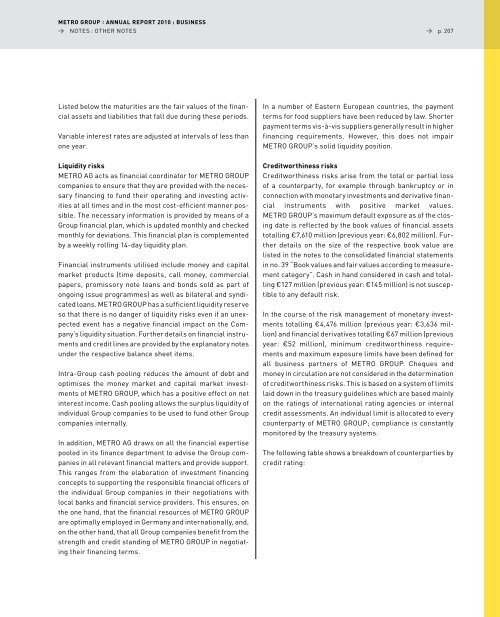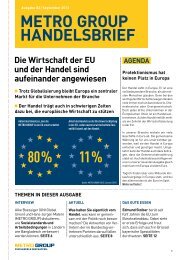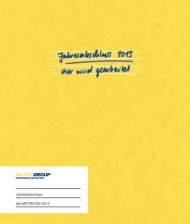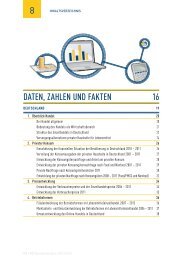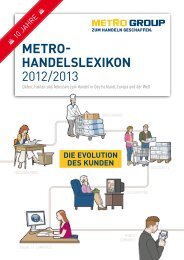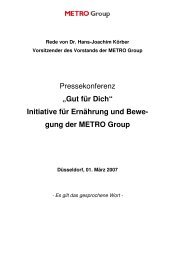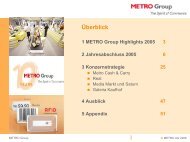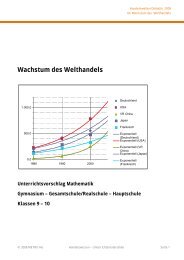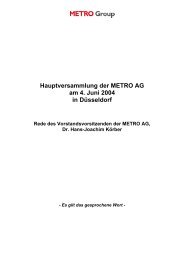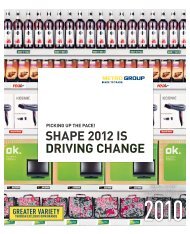pdf (2.5 MB) - METRO Group
pdf (2.5 MB) - METRO Group
pdf (2.5 MB) - METRO Group
You also want an ePaper? Increase the reach of your titles
YUMPU automatically turns print PDFs into web optimized ePapers that Google loves.
<strong>METRO</strong> GROUP : ANNUAL REPORT 2010 : BUSINESS<br />
→ NOTES : OThER NOTES<br />
listed below the maturities are the fair values of the financial<br />
assets and liabilities that fall due during these periods.<br />
Variable interest rates are adjusted at intervals of less than<br />
one year.<br />
Liquidity risks<br />
<strong>METRO</strong> AG acts as financial coordinator for <strong>METRO</strong> GROuP<br />
companies to ensure that they are provided with the necessary<br />
financing to fund their operating and investing activities<br />
at all times and in the most cost-efficient manner possible.<br />
The necessary information is provided by means of a<br />
<strong>Group</strong> financial plan, which is updated monthly and checked<br />
monthly for deviations. This financial plan is complemented<br />
by a weekly rolling 14-day liquidity plan.<br />
financial instruments utilised include money and capital<br />
market products (time deposits, call money, commercial<br />
papers, promissory note loans and bonds sold as part of<br />
ongoing issue programmes) as well as bilateral and syndicated<br />
loans. <strong>METRO</strong> GROuP has a sufficient liquidity reserve<br />
so that there is no danger of liquidity risks even if an unexpected<br />
event has a negative financial impact on the Company’s<br />
liquidity situation. further details on financial instruments<br />
and credit lines are provided by the explanatory notes<br />
under the respective balance sheet items.<br />
Intra-<strong>Group</strong> cash pooling reduces the amount of debt and<br />
optimises the money market and capital market investments<br />
of <strong>METRO</strong> GROuP, which has a positive effect on net<br />
interest income. Cash pooling allows the surplus liquidity of<br />
individual <strong>Group</strong> companies to be used to fund other <strong>Group</strong><br />
companies internally.<br />
In addition, <strong>METRO</strong> AG draws on all the financial expertise<br />
pooled in its finance department to advise the <strong>Group</strong> companies<br />
in all relevant financial matters and provide support.<br />
This ranges from the elaboration of investment financing<br />
concepts to supporting the responsible financial officers of<br />
the individual <strong>Group</strong> companies in their negotiations with<br />
local banks and financial service providers. This ensures, on<br />
the one hand, that the financial resources of <strong>METRO</strong> GROuP<br />
are optimally employed in Germany and internationally, and,<br />
on the other hand, that all <strong>Group</strong> companies benefit from the<br />
strength and credit standing of <strong>METRO</strong> GROuP in negotiating<br />
their financing terms.<br />
→ p. 207<br />
In a number of Eastern European countries, the payment<br />
terms for food suppliers have been reduced by law. Shorter<br />
payment terms vis-à-vis suppliers generally result in higher<br />
financing requirements. however, this does not impair<br />
<strong>METRO</strong> GROuP’s solid liquidity position.<br />
Creditworthiness risks<br />
Creditworthiness risks arise from the total or partial loss<br />
of a counterparty, for example through bankruptcy or in<br />
connection with monetary investments and derivative financial<br />
instruments with positive market values.<br />
<strong>METRO</strong> GROuP’s maximum default exposure as of the closing<br />
date is reflected by the book values of financial assets<br />
totalling €7,610 million (previous year: €6,802 million). further<br />
details on the size of the respective book value are<br />
listed in the notes to the consolidated financial statements<br />
in no. 39 “Book values and fair values according to measurement<br />
category”. Cash in hand considered in cash and totalling<br />
€127 million (previous year: €145 million) is not susceptible<br />
to any default risk.<br />
In the course of the risk management of monetary investments<br />
totalling €4,476 million (previous year: €3,636 million)<br />
and financial derivatives totalling €67 million (previous<br />
year: €52 million), minimum creditworthiness requirements<br />
and maximum exposure limits have been defined for<br />
all business partners of <strong>METRO</strong> GROuP. Cheques and<br />
money in circulation are not considered in the determination<br />
of creditworthiness risks. This is based on a system of limits<br />
laid down in the treasury guidelines which are based mainly<br />
on the ratings of international rating agencies or internal<br />
credit assessments. An individual limit is allocated to every<br />
counterparty of <strong>METRO</strong> GROuP; compliance is constantly<br />
monitored by the treasury systems.<br />
The following table shows a breakdown of counterparties by<br />
credit rating:


